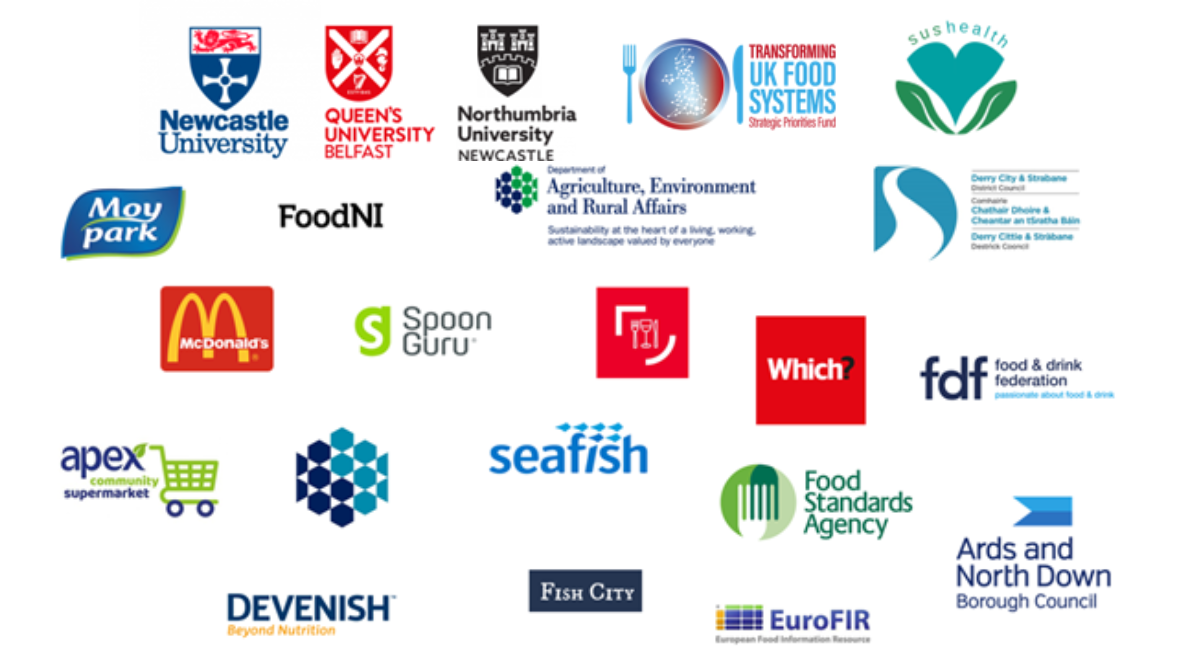SusHealth
Sus-Health Project
The overall aim of the Sus-Health project is to assess the “Sus-Health concept”. We propose to make decision making easier with respect to sustainability and health, by looking at the food system through a new single “lens” that combines nutritive and environmental value of a food in one single metric and assesses its impact on consumers, industry, and policy.
The project brings together multidisciplinary teams from Newcastle University and Queen's University Belfast, as well as many project partners from the food industry and policy sectors. Leading the project as PI is Lynn Frewer, Professor of Food and Society. Lynn, a social scientist and psychologist from the School of Natural and Environmental Sciences at Newcastle University, leads the Newcastle team and actively participates in all work packages (WPs). Paul Brereton, QUB Professor of Practice and the Director of Strategic Alliances at the Institute for Global Food Security, will lead the QUB team.
The research team consists of university researchers from both Newcastle University, Queen's University Belfast, and Northumbria University, representing a diverse range of academic disciplines. Their expertise spans fields such as food and food systems, health, sustainability, economics, and consumer attitudes and behaviour. The inclusion of these various disciplines will enable the project to be truly transformative.
The Sus-health concept
We aim to make food choice decision-making easier with respect to sustainability and health, by looking at the food system through a new single “lens” that combines nutritive and environmental value of a food into single metric, and assess its impact on consumers, industry, and policy. We propose to build on recent work (Grigoriadis 2021, Tepper 2021) to develop and test a pragmatic approach to identifying healthy, sustainable foods that will support informed, consistent decision making by stakeholders, including consumers, across the food system. The exact form of the index, and the nutrition and sustainability components that underpin it, will be decided in liaison with project partners stakeholders, and take into account existing policy. The project addresses this in the following ways:
1) by focussing on lower tier restaurants, canteens and takeaways that are accessible to disadvantaged groups
2) testing messaging/marketing that will best influence such groups;
3) testing direct and indirect intervention measures and scenarios in field experiments that will aid food affordability.
Sus-Health will deliver a proof-of-concept, demonstrated initially in socially deprived urban food systems in NI, and subsequently validated for a representative sample of consumers in the UK national food system. It will demonstrate a joined up, whole systems approach to developing pragmatic solutions that respond to the needs of all stakeholders in relation to transformation to a food system that delivers nutritious, sustainable, and affordable food.
To ensure impact, the project emphasizes co-designing throughout. This includes identifying objectives, designing research, analysing, and interpreting data, and implementing strategies, while considering the input and involvement of project stakeholders from industry, the public sector, and civil society.
Programme and Research Activities
Aim
To promote the consumption of sustainable and healthy food
Sus-Health is a new interdisciplinary project funded through UKRI’s ‘Transforming UK food systems’ programme. Sus-Health aims to establish a blueprint of a system that incentivises the consumption of sustainable and healthy foods. Sus-Health will code in with, and demonstrate to, stakeholders how the use of the combined measure of environmental impact and nutritive value (the Sus-Health Index) of foods can be used to influence the future direction of our food system.
Method
A coproduced and interdisciplinary research approach based on stakeholder driven innovations
The objectives of Sus-Health will be achieved through: a) Co-developing an actionable Sus-Health index and scoring system with stakeholders to combine the environmental and nutritional value of foods; b) Sus-Health communication tools will be applied to transforming index scores into changes in food production and consumption practices. This will be conducted through interventions in Northern Ireland, and at a UK scale through national surveys; c) Sustainability and Health Cost Offsets to the pricing of food choices on menus; and d) the provision of a Sus-Health toolkit will be validated using a “living lab” approach as well as at UK scale through experimental online research.
Outcomes
Interventions for more healthy, sustainable, and affordable food
Sus-Health’s key outputs will be
- stakeholder guidelines for using the Sus-Health index and related communication tools;
- an understanding of how consumer preferences can be influenced for healthier and more sustainable food choices using the communication tools and the Sus-Health assessment on real settings (e.g., restaurants, digital and physical retailers).
- interventions focused on food affordability e.g., economic assessments of direct policy interventions that would make healthy sustainable food more affordable.
Achieving an innovative solution for influencing consumer food choices and preferences
Sus-Health will co-create a systemic strategy and innovative solution for influencing food choices and consumption, so that they better align with both sustainability targets and nutritional guidelines. Research examining consumer preferences (through living lab experiments) will feed back down the entire food chain, influencing the processes and raw materials used, towards more sustainable and health-inducing foods and diets.
Reference/Research Outputs
EFFOST conference 2022:
- Grigoriadis V., Ojo M., Areal F., Brereton P., Collins O., Hutchinson G., McCarthy D., Raley M., Smyth B., Vlajic J., Woodside J., Frewer L. (2022). Transformative change towards more sustainable and healthy diets for all – An outline of the Sus-Health project. 36thEFFoST International Conference. Dublin, Ireland, 7-9 November.
- Grigoriadis, V.; Woodside, J.V.; Nugent, A.; McCarthy, D.; Brereton, P.; Frewer, L.J. (submitted). A comparison of a range of nutrient profiling models as applied to cooked meals.
EFFOST conference 2023:
37th EFFoST International Conference. Valencia, Spain, 6-8 November 2023.
- Livingstone, J; Smyth B.; Grigoriadis, V.; Brereton, P.; Frewer, L.J. (submitted). Calculating environmental impact for meals: problems and implications for standardisation. 37thEFFoST International Conference. Valencia, Spain, 6-8 November 2023.
Relevant Literature
- Grigoriadis, V., Nugent, A., & Brereton, P. (2021). Working towards a combined measure for describing environmental impact and nutritive value of foods: A review. Trends in Food Science & Technology, 112, 298-311.
Combined Labelling
- Bunge, A. C., Wickramasinghe, K., Renzella, J., Clark, M., Rayner, M., Rippin, H., Halloran, A., Roberts, N. & Breda, J. 2021. Sustainable food profiling models to inform the development of food labels that account for nutrition and the environment: a systematic review. The Lancet Planetary Health, 5, e818-e826.
- Guo, A. N., Bryngelsson, S., Strid, A., Bianchi, M., Winkvist, A. & Hallström, E. 2022. Choice of health metrics for combined health and environmental assessment of foods and diets: A systematic review of methods. Journal of Cleaner Production, 365.
- De Bauw, M., Matthys, C., Poppe, V., Franssens, S. & Vranken, L. 2021. A combined Nutri-Score and ‘Eco-Score’ approach for more nutritious and more environmentally friendly food choices? Evidence from a consumer experiment in Belgium. Food Quality and Preference, 93, 104276.
- Green, A., Nemecek, T. & Mathys, A. 2023. A proposed framework to develop nutrient profiling algorithms for assessments of sustainable food: the metrics and their assumptions matter. The International Journal of Life Cycle Assessment, 28, 1326-1347.
- Tobi, R. C. A., Harris, F., Rana, R., Brown, K. A., Quaife, M. & Green, R. 2019. Sustainable Diet Dimensions. Comparing Consumer Preference for Nutrition, Environmental and Social Responsibility Food Labelling: A Systematic Review. Sustainability, 11, 6575.
Environmental Labelling
- Potter, C., Pechey, R., Cook, B., Bateman, P., Stewart, C., Frie, K., Clark, M., Piernas, C., Rayner, M. & Jebb, S. A. 2023. Effects of environmental impact and nutrition labelling on food purchasing: An experimental online supermarket study. Appetite, 180, 106312.
- Arrazat, L., Chambaron, S., Arvisenet, G., Goisbault, I., Charrier, J.-C., Nicklaus, S. & Marty, L. 2023. Traffic-light front-of-pack environmental labelling across food categories triggers more environmentally friendly food choices: a randomised controlled trial in virtual reality supermarket. International Journal of Behavioral Nutrition and Physical Activity, 20.
- Brown, K. A., Harris, F., Potter, C. & Knai, C. 2020. The future of environmental sustainability labelling on food products. The Lancet Planetary Health, 4, e137-e138.
- Wolfson, J. A., Musicus, A. A., Leung, C. W., Gearhardt, A. N. & Falbe, J. 2022. Effect of Climate Change Impact Menu Labels on Fast Food Ordering Choices Among US Adults: A Randomized Clinical Trial. JAMA Network Open, 5, e2248320-e2248320.

